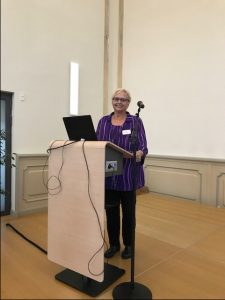 Regardless of one’s language, Restorative Justice (“RJ”) translates as hope. That was evident from my experience in Germany last October at a conference hosted by the University of Göttingen, which was titled “Victim Orientation in the Criminal Justice System: Practitioners’ Perspectives.”
Regardless of one’s language, Restorative Justice (“RJ”) translates as hope. That was evident from my experience in Germany last October at a conference hosted by the University of Göttingen, which was titled “Victim Orientation in the Criminal Justice System: Practitioners’ Perspectives.”
I was invited to be one of the keynote presenters at the two-day conference. My presentation to the attendees — most of whom were criminal justice professionals including probation and parole agents — addressed how the United States actively uses RJ processes within the criminal justice system. Oh, and my presentation was the only one in English, with real-time translation provided in German through the marvels of headset technology.
I have become used to speaking internationally, so the language difference is not a daunting barrier for me, especially given the immediacy of RJ as an understandable concept and successful tool. I described the process and impact of victim/offender dialogue sessions in cases of violent crime and the value of restorative circles, particularly for schools and community organizations. Although Europe does not have much experience in using circles, I could tell that the conference attendees were eager to hear more about that process and about victim/offender dialogues in the context of juvenile RJ. As usual, most of my explanations were told through the stories of actual cases. I know that by describing the poignant experiences of real victims and offenders, the audience will better understand the transformational experience of an RJ process.
Asked to discuss the appropriateness of using RJ with juvenile offenders, I explained how youth are perhaps most amenable to being impacted because a face-to-face meeting with a victim really can transform a young offender’s life at a critical stage. There is often a tremendous sense of revelation when young people hear directly how their actions stole more than physical property, impacting the victims’ sense of safety, trust and peacefulness. And instead of seeing offenders simply as hopelessly bad kids, it is not uncommon for victims to be transformed as they hear the life stories of these youth. In fact, some victims become parental figures interested in helping reshape circumstances for these young people, hoping to help them make good choices in the future.
RJ speaks the language of hope everywhere.
